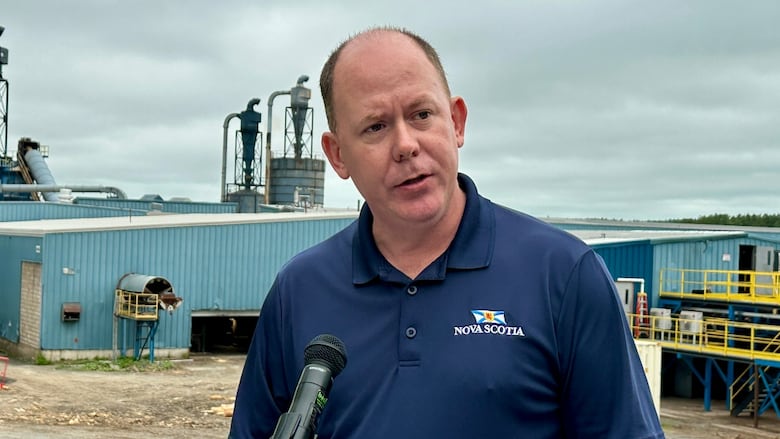Province promises more wood heat, wood buildings in wake of Northern Pulp selling off assets
2 business owners in the forestry sector give province's efforts thumbs up

Days after Nova Scotia's forestry sector was dealt a major blow, the province is promising to use more wood to heat and construct public buildings — although officials deny any connection between the two developments.
Two cabinet ministers made the announcement Thursday at Ledwidge Lumber, a sawmill in Enfield, N.S.
Public Works Minister Fred Tilley said every government department is being directed to look for opportunities to use wood products that are leftover after trees have been harvested and milled for lumber. The products could include mass timber, wood pellets, biomass and biofuels.
Tilley said the move was driven by the province's desire to become more self-reliant, reduce fossil fuel use and produce more locally-made construction materials.
"Local wood products are going to be a big part of our solution," Tilley said.
The announcement came three days after news that officials with Northern Pulp were abandoning plans for a possible new mill and bioproducts hub that would have been constructed near Liverpool around the site of the former Bowater paper mill.
Until its original mill shut down five years ago, Northern Pulp bought up large quantities of low-grade wood products from woodlots across the region. The mill's closure left the industry searching for new markets, and hoping the operators would restart.
Earlier this week, Northern Pulp officials said they had completed a feasibility study of a proposed project in Liverpool, N.S., and found it would not achieve the targeted 14 per cent rate of return.
"This is not in response to the announcement of Northern Pulp," said Natural Resources Minister Tory Rushton.
"This is one of many things that have been in the breadbasket to work on for low-grade wood fibre and our forestry sector. This has been worked on for some time," he said.

The province said it will launch a procurement in the near future to get new wood-fired heating systems for buildings and district heat projects, which are multiple buildings using a shared heating system.
It's also promising to review its policies to ensure wood heat and construction are considered in all projects and that there are no barriers to their use.
Rushton and Tilley could not say how long this work would take or what it could cost.
Doug Ledwidge, the president of Ledwidge Lumber, endorsed the province's efforts, noting the challenge the Canada-U.S. trade dispute has created for his industry. Forest Nova Scotia estimates the industry exports about $600 million of products to the U.S. every year.
"Local is a good place to sell our products," Ledwidge said.

Ledwidge Lumber is working on a new biofuel project that would use shavings, sawdust and pulp chips from its sawmill to create a liquid heating fuel. Ledwidge said he would be "pretty happy" to see the province buy the product for hospitals or schools.
He said it's difficult for the forestry industry to practise ecological forestry — a system adopted by the previous Liberal government — without the market that Northern Pulp provided, but projects such as this help.
"By no means is it the same volume, but it's chipping away at it," said Ledwidge.
Ledwidge Lumber is also a partner in a startup called Mass Timber Company, which is aiming to build a plant in Elmsdale to produce mass timber — an engineered wood product — to be used in building construction.
Patrick Crabbe, Mass Timber Company's president and CEO, said the plant could be built in two to two-and-a-half years. It is still contingent on financing.
He lauded the province's new commitment to wood products, calling it "an exemplary effort."
Court documents shed light on Northern Pulp's plans
Meanwhile, lawyers for Northern Pulp were in a British Columbia courtroom on Thursday where they received approval for a plan to extend creditor protection while preparations continue to auction off the outfit's Nova Scotia assets.
Documents filed as part of that process include the pre-feasibility assessment for the Liverpool project, which ultimately led to the determination the idea was not viable.
According to the document, the project capacity would have struck "a balance between the available wood resources in Nova Scotia and the critical scale needed to be competitive on the pulp markets."

A conventional pulp mill would have a rate of return below six per cent, according to the document. Northern Pulp said a new project needed to generate a rate of return of 14 per cent.
"Instead, the Liverpool Project would need to monetize the full value of fibre and become a state-of-the-art biorefinery producing pulp, electricity, biochemical byproducts and capture carbon," reads the document.
The price tag would have been $3.7 billion and that would not have been enough to reach the 14 per cent rate of return, according to the report.
The project would have been a "first-of-a-kind for Canada and the rest of the world."
"Furthermore, recent developments in global pulp markets point to a prolonged downcycle risk that would make the assumed selling price in the financial model unattainable, at least for the first years after the potential commissioning."
Of Northern Pulp's assets in this province, perhaps the most significant is almost 200,000 hectares of timberlands.
With files from Michael Gorman

